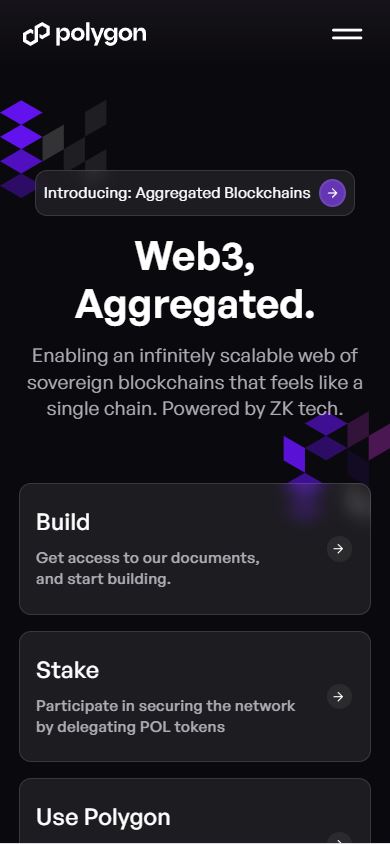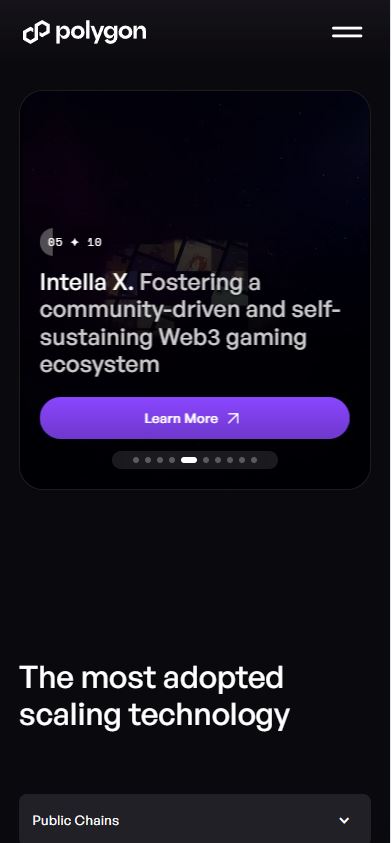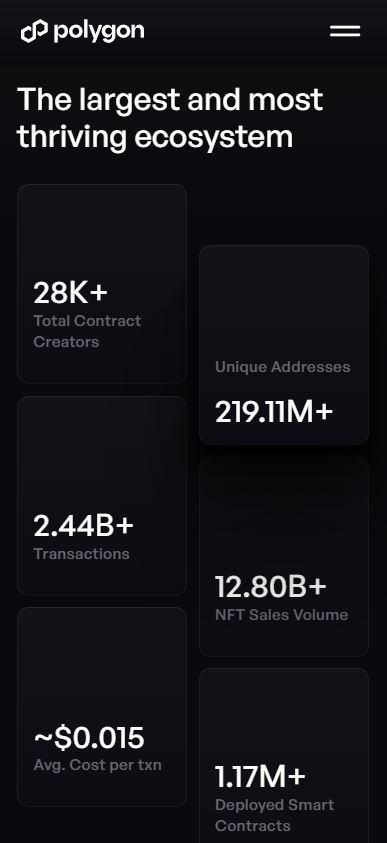About Polygon Ecosystem Token (POL)
What is the Polygon Ecosystem Token (POL) ?
The Polygon Ecosystem Token (POL) is a crucial utility token within the Polygon network, playing an integral role in supporting a wide range of services and operations within its ecosystem. The token serves multiple purposes, offering valuable functionalities such as staking, governance, and access to exclusive services.
- Staking: POL holders can lock up their tokens as part of the network’s staking mechanism, allowing them to participate in Polygon’s consensus processes. This staking helps secure the network and ensures that participants can earn rewards based on the tokens they have staked. By participating in staking, users contribute to the integrity and decentralization of the network, while also receiving rewards for their efforts.
- Governance: POL token holders have the ability to influence the direction of the Polygon ecosystem through governance. By holding tokens, users gain voting rights on important proposals, allowing them to make decisions that impact the platform’s development, protocol upgrades, and other key matters.
- Exclusive Access: The Polygon Ecosystem Token provides holders with the ability to unlock special features, applications, and services within the ecosystem. This creates a layer of exclusivity for token holders, granting them opportunities not available to the general public.
The future potential of the Polygon Ecosystem Token is directly linked to its diverse range of uses and the overall growth of the Polygon network. As the network continues to evolve, especially with more services and decentralized applications being built on it, the demand for the token is expected to grow, potentially leading to a rise in its value.
However, it is essential for potential investors to conduct thorough research before purchasing the Polygon Ecosystem Token. The cryptocurrency market is volatile, and the value of tokens can be influenced by various factors.
How is the Polygon Ecosystem Token (POL) Secured?
The security of the Polygon Ecosystem Token is ensured through a combination of technological mechanisms and community-driven efforts.
- Proof-of-Stake (PoS): At the heart of the Polygon network is the Proof-of-Stake consensus mechanism, which requires validators to stake tokens as a security deposit. This system helps prevent malicious actions, as validators have a financial incentive to act honestly. If a validator behaves dishonestly, they risk losing their staked tokens.
- Rate Limits and Checkpoints: To further enhance security, the ecosystem employs rate limits, which restrict the number of transactions a user can perform within a specific timeframe. This prevents abuse and spam on the network. Additionally, checkpoints are regularly created, recording the state of the blockchain. These checkpoints are anchored to the Ethereum main chain, ensuring the blockchain’s integrity even in the event of a breach, allowing the system to be restored to a secure state.
- Privacy and Fair Distribution: The Polygon Ecosystem also prioritizes privacy, ensuring that users’ identities and transactions are kept secure. Moreover, the token follows a fair distribution model that discourages centralization, aiming to distribute tokens widely across the community.
- Community and Innovation: The security of the ecosystem is not only bolstered by technical measures but also by the active participation of the community. Continuous innovation ensures that the platform stays ahead of potential threats, while the community remains vigilant in identifying vulnerabilities.
For users looking to store their Polygon Ecosystem Tokens, a range of wallet options are available, including web wallets, iOS, Android, and hardware wallets. Each option provides varying degrees of security and convenience, enabling users to choose the one that best fits their needs.
In summary, the security of the Polygon Ecosystem Token is multi-layered, combining technological mechanisms, privacy measures, and strong community involvement to safeguard the network and its participants.
How Will the Polygon Ecosystem Token (POL) be Used?
The Polygon Ecosystem Token (POL) serves a variety of purposes within the network, making it a versatile asset. Its key uses include:
- Utility Income Distribution: POL plays a role in the allocation of rewards within the ecosystem, ensuring that contributors and stakeholders receive fair compensation for their participation.
- Taxes and Fees Collection: The token is used for the collection of transaction fees, service charges, and other forms of financial obligations within the ecosystem, which helps maintain the infrastructure and ensure its smooth operation.
- Rewards for Staking: POL incentivizes users to participate in staking, with rewards given in exchange for locking up tokens to support the network’s operations. This not only helps secure the network but also encourages users to hold onto their tokens, fostering long-term engagement.
- Exchange for Services and Initiatives: The token is also used as a medium of exchange for various services and applications within the ecosystem. These can include decentralized finance (DeFi) platforms, non-fungible tokens (NFTs), and other blockchain-based services, enhancing liquidity and accessibility within the ecosystem.
Due to its diverse utility within the Polygon network, the POL token offers ample opportunities for users to interact with the ecosystem in multiple ways, from earning rewards to accessing exclusive services.
As with any cryptocurrency investment, it is important for potential investors to research and understand the risks involved, given the volatile nature of the market.
Key Events for the Polygon Ecosystem Token (POL)
Several key events have marked the evolution of the Polygon Ecosystem Token, highlighting its growth within the broader cryptocurrency market.
- Ethereum 2.0 Launch: The launch of Ethereum 2.0, which aims to improve the scalability, security, and sustainability of the Ethereum blockchain, has a positive ripple effect on all tokens built on Ethereum or its layer-2 networks, including the Polygon Ecosystem Token. The improved infrastructure will likely result in faster and more cost-effective transactions, benefiting the entire ecosystem.
- Visa’s Crypto Transaction Settlement on Ethereum: Visa’s decision to settle transactions with its crypto partners on the Ethereum network represents a major step towards mainstream adoption of cryptocurrency. Polygon’s integration into the Ethereum ecosystem positions it as a key player, increasing the potential for POL to gain further recognition and use.
- Polygon PoS Integration into 0x0 Ecosystem: The integration of Polygon Proof of Stake (PoS) into the 0x0 ecosystem is another notable development. PoS enables more efficient transaction validation compared to the traditional Proof of Work model, leading to improved transaction speeds and reduced costs. This integration further enhances the utility of the Polygon Ecosystem Token and makes it more appealing for both users and developers.
These key events signify the growing acceptance and utility of the Polygon Ecosystem Token within the blockchain and cryptocurrency space, suggesting a promising future for the token as it becomes increasingly integrated into global financial systems.
Overall, the Polygon Ecosystem Token (POL) is a vital component of the Polygon network, and its utility, security, and involvement in important developments suggest that it has significant potential for growth in the coming years. However, like all investments in the cryptocurrency market, it’s important to stay informed and understand the inherent risks before making decisions.






















Harran –
POL